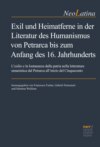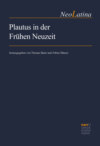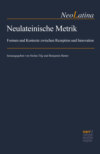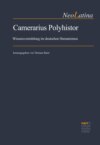Kitabı oku: «Exil und Heimatferne in der Literatur des Humanismus von Petrarca bis zum Anfang des 16. Jahrhunderts», sayfa 8
The second and last letter (PhE·02.31) to Niccolò Niccoli that was included in the epistolarium is dated to a few weeks earlier, to wit 13 April 1433. Filelfo urges Niccoli to drop his unfounded accusations and agitation against him and he accuses Niccoli of “considering it an honour to manage to ban all good and learned men from Florence” and of “being proud of having chased Manuel Chrysoloras and kicked out Guarino and Giovanni Aurispa, leaving only Filelfo to be shortly exiled or harmed.”21
*
Not long afterwards, Filelfo was indeed forced to leave Florence. He describes his motivations for moving in two letters sent from Siena, where he first took refuge: on 28 February 1436 to Giuliano Cesarini (PhE·02.66), declining the cardinal’s invitation for him to act as interpreter at the Ecclesiastical Council if it were held in Basel or anywhere else outside Italy. “However, if the possibility exists that the council will take place in Italy, I will follow your advice and accept your kind offer, provided that it is safe for me to attend. For Florence I must avoid like the plague (Florentia mihi non secus vitanda est quam pestilitas quaedam ac pernicies), due to the snares laid by those who have made it their foremost mission to eliminate all good and learned men. In fact, you know how I have been treated and what I need to watch out for.” The next letter is dated to 11 April 1436 and addressed to Leonardo Bruni (PhE·02.67), who had informed Filelfo through his friend Lapo da Castiglionchio that he deeply regretted Filelfo’s leaving Florence: “Although I enjoyed living in Florence (for many reasons, but most of all because of you, learned and excellent man that you are), I am happier now that I have left the place, knowing as I do that many snakes lurk among the flowers, and venomous and malicious ones at that (inter istos flores multae viperae delitescunt, et eae quidem venenosae ac pestiferae). For the restraint and patience with which I always put up with the traps set by my enemies have not escaped your notice. So, in order to escape a perpetually imminent disaster, I took refuge from those continually troubled waters in the next anchorage, Siena, where I will remain until a more favorable wind takes me to a safer port. For I see that even here I cannot lead a life that is secure enough, on account of the city’s proximity to those who (as it appears to me) hate the fact that I am alive.”
Filelfo’s worst fears came through: not much later the Medici sent a mercenary to Siena in order to assassinate (or mutilate) their nemesis Filelfo. He relates the incident in a letter to his former pupil Enea Silvio Piccolomini (PhE·03.04, 28 March 1439): “As to the identity of the assassin, it is well-known; as to the identity of the person who hired him, however, although nothing is certain, the finger is being pointed at the Medici and Cosimo, not only because his clan has always opposed me, but also because his brother Lorenzo has openly acted against me on many occasions. A few months later, Cosimo himself was first imprisoned on account of the civil strife, and then banished to Venice, without any further complaint from the populace. The civil unrest calmed down for a while as a result, until Cosimo, having bribed the leaders of the republic, was invited back to the city a year later. Then all law, both human and divine, was thrown into chaos. All the aristocrats were either banished or outlawed. Plundering, mugging, and murdering ensued. I witnessed this in person and realised the danger I was in by staying in the great shipwreck that was Florence, since I had already been shipwrecked before, in a manner which had come, so to speak, like a bolt from the blue.”
The first three letters of book 4 of Filelfo’s epistolarium are closely connected, yet too long to be discussed in detail here. Strangely enough, the second and the third letter predate the first one, since PhE·04.01 is sent on 11 July 1440 to Rinaldo degli Albizzi, one of the Florentine aristocrats who had been exiled after Cosimo’s return to power in 1434. In this letter, Filelfo informs Rinaldo that Filippo Maria Visconti is willing to send troops to help the exiled Florentine aristocrats recapture their hometown. In PhE·04.02, sent on 16 June 1440 to the Senate and people of Florence, Filelfo states that he has always admired Florence and cherishes the memory of the honours bestowed on him. He condemns discord and encourages the Florentines to readmit the exiled aristocrats and to reconcile with Filippo Maria Visconti. In PhE·04.03, sent on 4 July 1440, to Cosimo de’ Medici himself, Filelfo refers to the preceding letter and urges Cosimo to follow Filelfo’s advice: he should readmit the exiled aristocrats and make peace with Filippo Maria Visconti. In both these long letters Filelfo again uses the plague imagery to convey the threat posed by factional tendencies. In PhE·04.02 Filelfo states that enhancing the presence of partisanship, factions, baleful rivalries and ambitions of the citizens (posteaquam partium studia fovere, factiones complecti, pestiferas aemulationes ambitionesque civium alere coepisset) will inevitably make the city collapse. In his concluding remarks he argues that while money and manpower can favour a city’s well-being when its citizens are living in concord, “in the presence of civil discord and factions, all those assets are quite detrimental and destructive” (haec omnia et detrimentosa admodum sunt et pestifera).
In PhE·04.03, then, Filelfo urges Cosimo to count his blessings rather than to strive for ever more power, causing shipwreck for his hometown. Indeed, he continues, people who want to dominate cause “private and public animosity, pernicious factions (pestiferae factiones), sedition, and even civil war,” bringing their fatherland down.
*
This mental landscape of Filelfo’s staging Cosimo de’ Medici as a pestiferous beast that cannot contain its appetites and passions, as a ‘Cosmic plague’ threatening the city with his unreasonable ambitions and thereby with detrimental factionalism, is the background against which we see Palla Strozzi and Manuel Chrysoloras leaving a pestilential Florence to find the answer to an essential question that goes to the core of our condition humaine, and asking themselves how to cope with it. Indeed, the passage quoted above, where we saw Strozzi and Chrysoloras arrive in the Casentino, continues as follows (3, 131–132):
Et quoniam ad quietem veneramus, non ad laborem, ocio magis quam negocio studebam, idque ob eam maxime rationem, ut viro illi quem ego, ut nosti, plurimum venerabar, iucunditati essem in ea calamitate temporum, non molestiae. Tum ille postridie ex quo eo loci perveneramus, circiter meridiem, cum amota mensa simul sederemus in porticu, magno cum silentio, ad me conversus: ‘Cur non nostri, o Pallas,’ inquit, ‘similes sumus?’ Ad quod ego dictum veluti excitatus non sine pudore subdidi: ‘Cur istud, o Manuel?’ Tum ille: ‘Scis enim agere proprium esse hominis. Nam caetera animalia, quoniam ratione carent, agere non dicuntur, quemadmodum ne pueri quidem ob tenerae aetatis imbecillitatem, nec etiam ii qui sanae mentis non sunt. Solos agere dicimus, qui rationis ductu id faciunt. Nam appetitio nobis est communis cum beluis, quae mentis inopes ad sensum omnia referunt.’ Et ita vir ille doctissimus et optimus nihil omisit quod ad totius hominis vitam, quod ad bene beateque vivendum pertineret. Quare non ipse meum quicquam locutus sum, sed quae ex Manuele Chrysolora audisse memini.
(And since we had come for rest, not for work, I was eager for leisure rather than business, especially because I wished to be at that calamitous time a source of pleasure rather than a burden to that man, whom, as you know, I deeply venerated. Then, the day after our arrival, around midday, after dinner, we were seated together in the portico. Amid the deep silence he turned to me and said, “Why, Palla, are we not like ourselves?” Stimulated by this question, I replied, not without embarrassment: “How so, Manuel?” He replied: “You know that action is proper to man. For other animals, lacking reason, are not said to act, just as children are not, by reason of the weakness of their tender years, or the insane. We only say that they act who do it under the guidance of reason. For we have appetency in common with beasts, who, being devoid of mind, relate everything to the senses.” And thus that most learned and best man omitted nothing relevant to the life of the whole man, to living well and blessedly. Therefore I did not say anything of my own, but what I remember hearing from Manuel Chrysoloras).
This scene is an illumination of the Commentationes Florentinae de exilio as a whole, a miniature mirroring the nine aristocrats and Filelfo meeting for a dialogue about their condition in exile, assisting each other in their soul-searching and looking for strategies to cope with life after the doomsday that made them all – including the narrating author – leave Florence, the cradle of Humanism. It is no coincidence that in this context Manuel Chrysoloras is quoted as the ultimate auctoritas concerning how one should approach life, the vir omni humanitate humanior, by whom – as Leonardo Bruni underscores in his immediate reply to Palla’s anecdote – “eloquence, buried already for so many centuries, was called back among the Latins as if from the underworld to the light, and so too were all the cultivated disciplines of the mind.” In other words, Chrysoloras was the founding father of the studia humanitatis that came into being in the blessed city of Florence before the pestiferous Cosimo and his allies such as Niccolò Niccoli chased them away, along with the aristocrats, such as Chrysoloras’ former pupil Palla Strozzi, and their good friend Francesco Filelfo, who happened to have the founding father Chrysoloras’ niece Theodora as his wife.
In this passage we see a rare illustration of the narrator introducing himself into the text as a character relevant to the overall story. Filelfo does this only on three other occasions in the whole narrative of the Commentationes Florentinae de exilio: twice to fashion himself as a Graecus (in the first instance he has Palla Strozzi quote some verses of Hesiod “that our friend Filelfo has translated for us” (1, 23), and in the second he has Poggio admit to Manetti that he “would easily prove to you how much value Homer attached to the strength and power of wine, if, like you, I had learned Greek from Filelfo, namely by those very verses which Niccolò Niccoli frequently praises to the skies,” soon thereafter also mentioning Chrysoloras’ Greek classes (1, 160).
The third occasion is when having listed famous people from antiquity who left their homeland to become successful elsewhere, Filelfo mentions as an initial contemporary example “Jacob Bucellus, a Florentine citizen of noble family, who could have lived most honorably in his homeland, the maternal uncle of our friend Francesco Filelfo, [but who] chose Tolentino as his homeland” (1, 210):
Et ne invidere nostrae tempestatis hominibus putemur: Iacobus Bucellus, et civis Florentinus et nobili familia natus, qui honestissime in patria esse posset, nostri huius Francisci Philelfi maternus avus, Tholentinum sibi patriam delegit, fuitque apud Rhodulfum illum seniorem – quo et ipsi fortunatissimo imperatore et Picentes iustissimo principe usi sunt – omnium primus.
The exemplum is not fortuitous: Filelfo’s claiming of noble Florentine ancestors is all the more relevant when we know that in his satires he liked to dwell upon the non-Florentine origin of the Medici.22 In the Commentationes too Filelfo refers three times to the Mugello background of the Medici. In book 3, for example, when Bruni points out that one would prefer to be noble rather than wealthy, Rinaldo degli Albizzi replies: “You are joking with us, Leonardo, as if you were not aware that Cosimo and Lorenzo de’ Medici have no qualms putting wealth not only before nobility but also before virtue” (3, 33). Bruni, however, begs to differ, stating that Rinaldo must be the joker, as he is talking about “freeborn men and Florentines, not natives of the Mugello and tame beasts (de Mucellensibus et servilibus beluis) who, since they were born, reared, and educated in obscurity never know how to act in broad daylight.”
*
In all this mirroring of historical reality and fictional narration, of frame story and related anecdotes, in this mise-en-abyme of allusions, cross-references and striking similarities, something should be said about the enigmatic question at the heart of our passage: “Why, Palla, are we not like ourselves (Cur non nostri similes sumus)?”
The phrase similis sui in classical Latin usually describes something that possesses an inherent resemblance to itself. This apparent tautology – how can something not resemble itself? – can be illustrated with a passage in which Cicero describes human degeneration from natural law (De legibus 1, 29). He remarks that, were it not for moral depravity, “no one would be so like himself, as all people would be like one another (sui nemo ipse tam similis esset quam omnes sunt omnium).” Universal self-similarity, in other words, coincides with the deeply moral state of humans as endowed by nature. So the issue is that we are not like ourselves, that some of us do not live in concordance with our true human nature.
The staging of Chrysoloras is indeed the justification of Palla’s explanation about appetency. He argues, with Chrysoloras, the vir omni humanitate humanior, that action and reason are proper to man, while “we have appetency in common with beasts (communis cum beluis), who, being devoid of mind, relate everything to the senses.”
It will be clear from various quotes above that the use of the word belua is hardly to be taken neutrally here, and that this is another example, albeit implicit this time, of the dehumanizing of Filelfo’s opponents, who are not capable of mastering their appetites and passions.
True human nature is another universe, the one of Boccaccio, where “Umana cosa è aver compassione degli afflitti,” to quote the opening words of the Decameron. In Boccaccio’s world, the plague cannot be controlled by any human act, nor can human love be governed by will. Both pestilence and desire overpower human ingegno. Boccaccio has the plague overcome every umano provedimento: the intellect is powerless, human ingenuity is unavailing. The tension between eros and thanatos, between pestilence and passion as it can be seen in the Decameron, has mutated in Filelfo’s Commentationes to an opposition between belua and ratio, between the plague of passion and the mental liberation assured by reason, by the wisdom of Greek philosophy – a wisdom of which Filelfo is the herald, as a familiaris of Chrysoloras, the founding father of Greek studies and thereby of Humanism.
At the end of the Decameron, Boccaccio’s brigata returns to Florence. For Filelfo’s exiled aristocrats, there was no such happy end in sight; perhaps that is one of the reasons why the Commentationes was due to remain an unfinished symphony. When after the Battle of Anghiari in 1440 it had become clear that they would not reconquer Florence, Filelfo even went as far as blaming the aristocrats themselves for having failed in their attempts to return to Florence. And he did so in a letter Rinaldo degli Albizzi, his former hero.23
*
The theme of exile is notably absent from Filelfo’s later writings – a silence that may be considered telling, since there are clear indications that he did indeed consider himself exiled from Florence, where as a young scholar he had been able to take up such a prominent position. The only exception is letter PhE·30.01, sent on 31 January 1469 to Federico da Montefeltro, where Filelfo cites the exemplum of Marcus Marcellus, who quite happily lived his exile in Mytilene because his newly won otium allowed him to dedicate his time to philosophy and the study of the virtues, freed as he was of all passions of the soul (cunctis animi perturbationibus vacuus se totum philosophiae contemplandisque virtutibus dedidisset).
Filelfo’s waning interest for the exile theme is also reflected by the fact that his Commentationes remain almost unmentioned after 1462. In March of that year Filelfo asks Cardinal Jean Jouffroy of Arras to deliver a copy of the work to Prospero Colonna (PhE·18.07 and 18.09) and in June of the same year, in the long letter PhE·18.25 consoling Onofrio and Gianfrancesco Strozzi on the passing away of their father, Palla Strozzi, he refers to the Commentationes for his description of how an extraordinary philosopher Palla showed himself in the disputes that Filelfo tried to record as much as his memory allowed.24 The only mention beyond that year is a letter from 7 October 1471 to Gasparino Ardizio, whom he asks to return a copy of the Commentationes.
The reason Filelfo seems to have grown rather reticent about the work might have been his ongoing negotiations with the Medici about a return to Florence. In fact, Filelfo maintained good contacts with Piero de’ Medici, and after courting Lorenzo il Magnifico for many years, he was finally invited back to teach at the Studio – while the protagonists in the Commentationes in real life had not been able to return and were forced to settle for the consolation of Greek philosophy. How ironically full became the circle then, when Filelfo himself in the end, after those protracted negotiations with the Medici – and at the same time having ‘negotiated’ the fall-out of his provocative, Medici-bashing satirical and consolatory writings – in the summer of 1481 finally was allowed to return to Florence, only to meet his own sudden death. And so it happened that Filelfo’s severely-suffered and ever-deplored exile from the — pestiferous — cradle of humanism, which he had been writing off for the better part of his career, came to an end at the same time as his exile in this worldly prison. To quote Albert Camus’ La peste one more time: “Si c’était l’exil, dans la majorité des cas c’était l’exil chez soi.”
Bibliography
Baldassarri, Stefano Ugo (ed.): Leonardo Bruni. Dialogi ad Petrum Paulum Histrum, Firenze 1994.
Blanchard, W. Scott: Patrician Sages and the Humanist Cynic. Francesco Filelfo and the Ethics of World Citizenship, Renaissance Quarterly 60, 2007, 1107–1169.
Bosisio, Matteo: “Difficile e pericolosa pugna”: la lectura Dantis di Francesco Filelfo, in: Rencontres de l’Archet, Morgex 2017, 121–128.
Calderini, Aristide: Ricerche intorno alla biblioteca e alla cultura greca di Francesco Filelfo, Studi italiani di filologia classica 20, 1913, 204–424.
Cao, Gian Mario: Tra politica fiorentina e filosofia ellenistica; il dibattito sulla ricchezza nelle Commentationes di Francesco Filelfo, Archivio Storico Italiano 45, 1997, 99–126.
Cao, Gian Mario: The Prehistory of Modern Scepticism: Sextus Empiricus in Fifteenth-Century Italy, Journal of the Warburg and Courtauld Institutes 64, 2001, 229–279.
Cortassa Guido / Maltese Enrico V. (edd.): Filelfo Francesco. De psychagogia (Περὶ ψυχαγωγίας). Editio princeps dal Laurenziano 58, 15, Alessandria 1997 (Hellenica, vol. 1).
De Keyser, Jeroen: The transmission of Francesco Filelfo’s Commentationes Florentinae de Exilio, Interpres 30, 2011, 7–29.
De Keyser, Jeroen / Speranzi, David: Gli Epistolographi Graeci di Francesco Filelfo, Byzantion 81, 2011, 177–206.
De Keyser, Jeroen / Blanchard, W. Scott: Francesco Filelfo. On Exile, Cambridge (Mass.) 2013 (I Tatti Renaissance Library, vol. 55).
De Keyser, Jeroen: Francesco Filelfo and Francesco Sforza. Critical edition of Filelfo’s Sphortias, De Genuensium deditione, Oratio parentalis and his Polemical Exchange with Galeotto Marzio, Hildesheim / Zürich / New York 2015a (Noctes Neolatinae, vol. 22).
De Keyser, Jeroen: Francesco Filelfo. Collected Letters (Epistolarum Libri XLVIII), 4 vols., Alessandria 2015b (Hellenica, vol. 54).
De Keyser, Jeroen: Francesco Filelfo’s feud with Poggio Bracciolini, in: David Lines / Marc Laureys / Jill Kraye (edd.): Forms of Conflict and Rivalries in Renaissance Europe, Göttingen / Bonn 2015c (Super alta perennis. Studien zur Wirkung der Klassischen Antike, vol. 17), 13–27.
De Keyser, Jeroen: Picturing the Perfect Patron? Francesco Filelfo’s Image of Francesco Sforza, in: Patrick Baker, Ronny Kaiser, Maike Priesterjahn, Johannes Helmrath (edd.): Portraying the Prince in the Renaissance; The Humanist Depiction of Rulers in Historiographical and Biographical Texts, Berlin 2016 (Transformationen der Antike, vol. 44), 391–414.
Ferraù, Giacomo: Le Commentationes Florentinae de exilio, in: Rino Avesani / Giuseppe Billanovich / Mirella Ferrari / Giovanni Pozzi (edd.): Francesco Filelfo nel quinto Centenario della morte. Atti del XVII convegno di Studi Maceratesi (Tolentino, 27–30 settembre 1981), Padova 1986 (Medioevo e umanesimo, vol. 58), 369–388.
Fiaschi, Silvia: Francesco Filelfo. Satyrae I (Decadi I–V), Roma 2005 (Studi e Testi del Rinascimento Europeo, vol. 26).
Heitzmann, Christian: Non tam Florentia nobis quam nos Florentie desyderio futuri sumus. Exil und Verbannung aus der Sicht italienischer Humanisten, in: Andreas Bihrer / Sven Limbeck / Paul Gerhard Schmidt (edd.): Exil, Fremdheit und Ausgrenzung in Mittelalter und früher Neuzeit, Würzburg 2000 (Identitäten und Alteritäten, vol. 4), 259–274.
Maisano, Riccardo / Antonio Rollo (edd.): Manuele Crisolora e il ritorno del greco in Occidente, Atti del Convegno internazionale, Napoli 26–29 giugno 1997, Napoli 2002.
Mazzocco, Angelo: Linguistic Theories in Dante and the Humanists. Studies of Language in Late Medieval and Early Renaissance Italy, Leiden / Köln / New York 1993.
Schadee, Hester: A Tale of Two Languages. Latin, the Vernacular, and Leonardo Bruni’s Civic Humanism, Humanistica Lovaniensia 67.1, 2018, 11–46.
Solerti, Angelo: Le vite di Dante, del Petrarca e del Boccaccio scritte fino al secolo decimosettimo, Milano [1905].
Tavoni, Mirko: Latino, grammatica, volgare. Storia di una questione umanistica, Padova 1984 (Medioevo e umanesimo, vol. 53).
Viti, Paolo: Filelfo, Francesco, in: Istituto della Enciclopedia Italiana (ed.): Dizionario biografico degli Italiani, vol. 47, Roma 1997, 613–626.
Wulfram, Hartmut: Ein Heilsbringer aus dem Osten. Manuel Chrysoloras und seine Entindividualisierung im italienischen Frühhumanismus, in: Foteini Kolovou (ed.): Byzanzrezeption in Europa. Spurensuche über das Mittelalter und die Renaissance bis in die Gegenwart, Berlin / New York 2012, 89–116.



